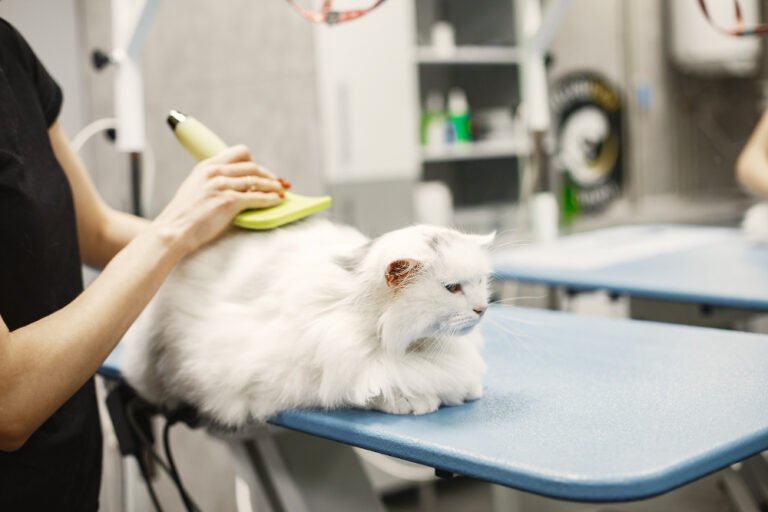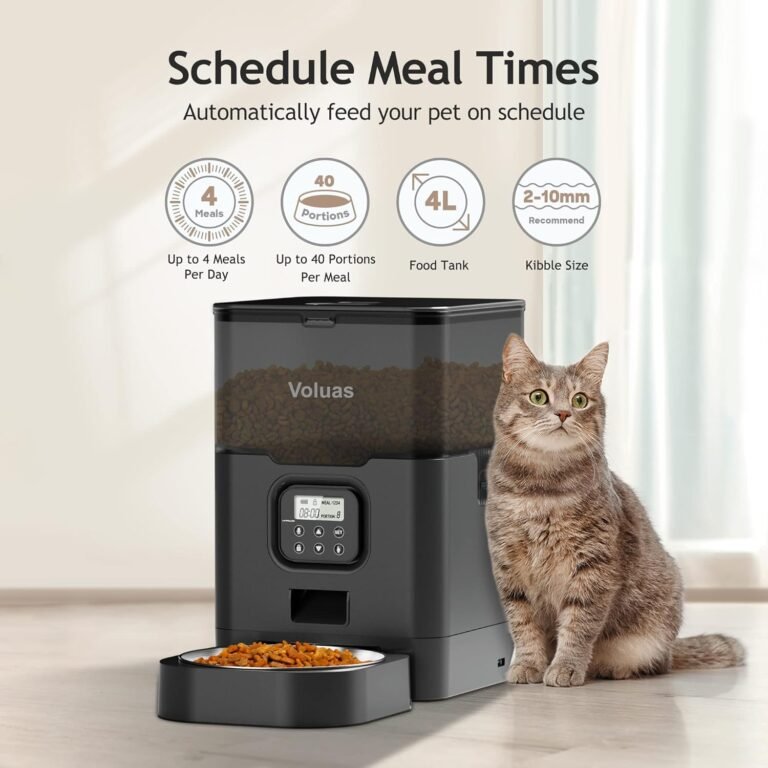Understanding Your Pet’s Health: Common Symptoms and When to Seek Help
Pets are members of our families, and their health is just as critical as ours. As pet parents, it’s our responsibility to ensure they maintain optimal health. Spotting the symptoms of illness at the earliest can be a lifesaver. This article will guide you to understand the common symptoms better and help you identify signs your pet may display when in poor health. So, arm yourself with this knowledge to provide the best care possible for your loved ones.
Key Takeaways
- Recognizing common symptoms is crucial for identifying when your pet is in poor health.
- Changes in appetite, weight loss or gain, lethargy, and vomiting and diarrhea are common physical symptoms of pet health problems.
- Behavioral symptoms such as aggression, excessive barking or meowing, changes in litter box habits, and separation anxiety can indicate underlying health issues.
- Respiratory symptoms like coughing, difficulty breathing, nasal discharge, and wheezing and panting should not be ignored.
- Skin and coat symptoms such as hair loss, itching and scratching, redness and inflammation, and foul odor may be signs of poor pet health.
Understanding Your Pet’s Health

Recognizing Common Symptoms
You know your pet as well as you know your best friend, and you can tell when something is wrong. There are signs you can look for to determine if your pet is feeling sick and should seek immediate medical attention.
- If your dog or cat suddenly stops eating or drinking, exhibits problems going to the bathroom, is vomiting, or has diarrhea, then it’s best to call our office.
- You should also reach out if you start noticing changes in their behavior or energy levels or if they’re showing signs of pain.
Our knowledgeable team will ask questions and set up an appointment to ensure your pet receives the care they need.
When to Seek Veterinary Help
As a pet parent, you may have an instinctual prompting to know when your fur baby needs medical attention. This may be due to sudden severe symptoms, limping, signs of pain in dogs, signs of pain in cats, wounds, or toxin ingestion. Please know that help is always available. Feel free to reach out to an urgent care veterinarian or an emergency veterinarian to clarify if your pet needs to be seen immediately. At Sploot, we offer tele-triage to help pet parents decide whether or not a pet needs urgent care and what steps to take — including first aid tips and the safest way to transport an injured dog or injured cat.
Physical Symptoms

Changes in Appetite
Variations in your pet’s appetite or sudden lack of interest in food can be a tell-tale sign of an underlying health issue. Is your usually playful pet now lethargic and inactive? Significant changes in your pet’s behavior may highlight potential health concerns. An unusual lack of energy or constant tiredness in your pet can suggest the onset of an illness. These signs warrant immediate attention; it might be best to schedule a vet check-up promptly.
Weight Loss or Gain
Weight loss or gain in your pet can be an indication of underlying health issues. Changes in appetite and body weight should be closely monitored to ensure your pet’s well-being. If you notice significant weight loss or gain in your pet, it is important to consult with a veterinarian. They can help determine the cause of the weight change and provide appropriate treatment. In some cases, weight loss or gain may be a result of a medical condition such as thyroid problems or digestive disorders. Regular check-ups and a balanced diet are essential for maintaining your pet’s optimal weight and overall health.
Lethargy and Lack of Energy
An unusual lack of energy or constant tiredness in your pet can suggest the onset of an illness. Changes in Eating Habits: Variations in your pet’s appetite or sudden lack of interest in food can be a tell-tale sign of an underlying health issue. Alterations in Behavior: Is your usually playful pet now lethargic and inactive? Significant changes in your pet’s behavior may highlight potential health concerns. These signs warrant immediate attention; it might be best to schedule a vet check-up promptly.
Vomiting and Diarrhea
Vomiting and diarrhea are common symptoms of gastrointestinal upset in pets. Gastrointestinal upset can be caused by various factors, such as ingesting toxins, irritants, or foreign objects that can irritate or block the intestines. Severe vomiting or diarrhea that persists for more than 12 hours, contains blood, or is accompanied by other severe symptoms like loss of appetite and reduced activity, requires urgent medical attention.
If you suspect that your pet has ingested something toxic, it is important to seek veterinary care immediately. Typical signs of poisoning include vomiting, diarrhea, unusual stools, and seizures. Do not induce vomiting unless instructed to do so by a professional. Contact your veterinarian or a pet poison hotline like Pet Poison Helpline at 855-764-7661 or ASPCA Animal Poison Control at 888-426-4435 for guidance.
Remember, gastrointestinal upset can also be caused by accidental ingestion of foreign objects or substances. If your pet shows signs of vomiting, diarrhea, or loss of appetite, it is best to consult with your veterinarian to determine the underlying cause and appropriate treatment.
In some cases, gastrointestinal upset may require dental treatment if it is caused by broken or mobile teeth. Our team at Sploot Vets can provide further information on the treatment process.
If you notice any of the following symptoms along with vomiting and diarrhea, it is important to seek veterinary help:
- Inability or straining to urinate
- Discolored urine
- Cloudiness, redness, or itching in the eyes
- Dry heaving or a large, painful abdomen
- Reluctance to run, play, or use stairs
- Leg stiffness or reluctance to rise or sit
- Scratching or shaking the head, tender ears, or ear discharge
Remember, as a pet parent, it is crucial to monitor your pet’s health and seek veterinary help when necessary to ensure their well-being.
Behavioral Symptoms

Aggression or Irritability
If your pet is displaying aggression or irritability, it may be a sign of underlying health issues. Changes in breathing can also be a cause for concern. It’s important to observe any changes in your pet’s behavior and seek veterinary help if needed. Here are some signs to look out for:
- Fearfulness or unusual aggression
- Change in appetite or water consumption
- Itchy skin or hair loss
- Lethargy or excessive sleeping
If you notice any of these symptoms, it’s best to consult with a veterinarian for a proper diagnosis and treatment plan.
Excessive Barking or Meowing
Excessive barking or meowing can be a sign that your pet is bored or not getting enough mental stimulation. It may also indicate that they are anxious or in pain. Pet CBD products for anxiety and pain relief can be helpful in calming your pet and reducing their excessive vocalization. Additionally, providing them with interactive toys and engaging in regular playtime can help alleviate their boredom and provide mental stimulation. If your pet’s excessive barking or meowing persists or is accompanied by other concerning symptoms, it is important to consult with a veterinarian for further evaluation and guidance.
Changes in Litter Box Habits
If your pet starts exhibiting changes in their litter box habits, it could be a sign of an underlying health issue. Pay attention to the following symptoms:
- Increased frequency of urination
- Straining or difficulty while urinating
- Blood in the urine
- Urinary accidents outside the litter box
These changes may indicate a urinary or kidney problem, and it’s important to seek veterinary help if you notice any of these symptoms. Prompt diagnosis and treatment can help ensure your pet’s health and well-being.
Separation Anxiety
Separation anxiety is a common behavioral symptom that many pets experience when they are separated from their owners for extended periods of time. It can manifest in various ways, such as excessive barking or meowing, destructive behavior, or even fainting and dizziness. If your pet exhibits these symptoms when you’re away, it’s important to address the issue to ensure their well-being and happiness.
Here are a few tips to help manage separation anxiety:
- Gradually increase the amount of time your pet spends alone to help them adjust.
- Provide them with engaging toys or puzzles to keep them occupied.
- Create a safe and comfortable space for them, such as a designated area with their bed and favorite toys.
- Consider using calming aids, such as pheromone diffusers or anxiety wraps.
Remember, it’s essential to seek professional help if your pet’s separation anxiety becomes severe or significantly impacts their quality of life. Your veterinarian can provide guidance and recommend appropriate treatment options.
Respiratory Symptoms

Coughing and Sneezing
If your pet is experiencing coughing and sneezing, it could be a sign of respiratory issues. Coughing is the body’s way of clearing the airways, while sneezing helps to expel irritants from the nose. There are several possible causes for these symptoms, including:
- Respiratory infections: Bacterial or viral infections can lead to coughing and sneezing, similar to a common cold in humans.
- Allergies: Pets, like humans, can be sensitive to allergens such as dust, pollen, and certain cleaning products, which can trigger coughing and sneezing.
- Asthma: Although less common, pets can also develop asthma, which causes inflammation of the airways and can result in coughing and sneezing.
If your pet is experiencing mild symptoms and is otherwise healthy, you can monitor them at home and contact your veterinarian as needed. However, if the symptoms persist, worsen, or if your pet is showing signs of distress such as labored breathing or loss of appetite, it is important to seek veterinary help. Your veterinarian can determine the underlying cause of the symptoms and provide appropriate treatment. Remember, early detection and intervention are key to ensuring your pet’s health and well-being.
Difficulty Breathing
If your pet is experiencing difficulty breathing, it is important to seek veterinary help immediately. Difficulty breathing can be a sign of a serious underlying condition that requires prompt medical attention. Labored breathing or shortness of breath can indicate respiratory distress, which may be caused by a variety of factors such as infections, allergies, or obstructions. It is crucial to have your pet evaluated by a veterinarian to determine the cause and provide appropriate treatment.
In some cases, difficulty breathing may be accompanied by other symptoms such as coughing, wheezing, or panting. These additional symptoms can provide important clues to the underlying cause of the breathing difficulty. Your veterinarian may perform diagnostic tests, such as x-rays or bloodwork, to further evaluate your pet’s condition.
If your pet is experiencing difficulty breathing, it is important to avoid any activities or environments that could exacerbate the condition. Keep your pet calm and comfortable, and do not attempt any home remedies without consulting a veterinarian first.
Remember, early intervention is key when it comes to respiratory issues. If you notice any signs of difficulty breathing in your pet, don’t hesitate to seek veterinary help. Your veterinarian will be able to provide the necessary care and treatment to help your pet breathe easier and improve their overall health and well-being.
Nasal Discharge
Nasal discharge is a common symptom in pets and can indicate various health issues. Runny nose and sneezing are often signs of respiratory infections or allergies. If your pet is experiencing nasal discharge, it’s important to monitor their symptoms and contact your veterinarian if they persist or worsen. In some cases, nasal discharge may be accompanied by lethargy and a persistent cough, which could be indicators of a more serious condition. It’s best to seek veterinary help if your pet is not eating, despondent, or not acting normally.
Wheezing and Panting
If your pet is experiencing wheezing and panting, it could be a sign of respiratory distress. Wheezing is a high-pitched whistling sound that occurs when there is a narrowing or blockage in the airways, while panting is rapid, shallow breathing that helps regulate body temperature. These symptoms may be caused by various factors, including allergies, infections, or obstructions in the airways.
If your pet is wheezing and panting, it is important to monitor their breathing closely. If the symptoms persist or worsen, it is recommended to seek veterinary care promptly. Your veterinarian can perform a thorough examination and diagnostic tests to determine the underlying cause and provide appropriate treatment.
In some cases, wheezing and panting may be a sign of a more serious condition, such as heart disease or respiratory infection. If your pet is exhibiting other symptoms like lethargy, loss of appetite, or coughing, it is crucial to seek professional help immediately.
Remember, early detection and intervention can greatly improve your pet’s health and well-being.
Skin and Coat Symptoms

Hair Loss or Excessive Shedding
If you notice that your pet’s fur is thinning, has patches missing, or has become matted, it could be a sign of hair loss or excessive shedding. Hair loss in pets can be caused by a variety of factors, including allergies, parasites, hormonal imbalances, or underlying health conditions. Excessive shedding, on the other hand, is a natural process for many animals, especially during certain seasons. However, if you observe excessive shedding that is not typical for your pet, it may indicate an underlying issue that requires attention.
To recognize these hidden signs, pay attention to any changes in your pet’s grooming habits or the appearance of their coat. If you notice excessive hair loss or shedding, it is recommended to consult with a veterinarian to determine the underlying cause and appropriate treatment. Your veterinarian can perform a thorough examination, conduct diagnostic tests if necessary, and provide guidance on how to manage and improve your pet’s coat health.
Itching and Scratching
Excessive itching and scratching is a common symptom that pet owners should pay attention to. It can be a sign of various underlying medical concerns, including food allergies. If your pet is constantly scratching and seems uncomfortable, it may be time to consult with a veterinarian. In addition to itching and scratching, there are other signs to watch out for that may indicate a need for veterinary help. These include visible injuries such as scratches or wounds, skin abnormalities like redness or a foul smell, unusual discharge from the eyes, nose, or ears, and swellings or lumps on the body. If you notice any of these symptoms, it’s important to seek professional advice to ensure your pet’s health and well-being.
Redness and Inflammation
Redness, or a foul smell, may indicate skin allergies or infections. Unusual Discharge: Watch out for unexpected discharge from your pet’s eyes, nose, or ears; they could suggest various ailments, from allergies to infections. Swellings or Lumps: Unexplained swellings or growths on any body part shouldn’t be ignored. They may signify a multitude of health issues, some serious. Observing these physical changes in your pet can help you identify problems early and seek timely veterinary care for a faster recovery.
Foul Odor
A foul odor coming from your pet can be a sign of underlying health issues. It could indicate skin allergies or infections if accompanied by redness or excessive scratching. Unusual discharge from your pet’s eyes, nose, or ears should also be monitored, as it could suggest various ailments, from allergies to infections. Additionally, unexplained swellings or lumps on any body part should not be ignored, as they may signify serious health problems. If you notice a foul odor or any of these physical symptoms, it’s important to seek timely veterinary care for a faster recovery.
Digestive Symptoms

Constipation or Diarrhea
Constipation or diarrhea in your pet can be a sign of gastrointestinal upset. It can be caused by various factors, such as neglecting grooming or ingesting a foreign object. Gastrointestinal upset may also involve symptoms like vomiting, loss of appetite, and abdominal pain. If your pet experiences severe diarrhea or vomiting that persists for more than 12 hours, contains blood, or is accompanied by other severe symptoms, it is important to seek urgent medical attention. In cases of apparent toxin ingestion, immediate veterinary care is necessary. If you suspect your pet has ingested something toxic, contact your veterinarian or a pet poison hotline for guidance.
Bloody Stools
Bloody stools can be a concerning symptom in your pet. It may indicate an underlying issue such as gastrointestinal upset or an injury to the intestines. If your pet is experiencing severe diarrhea or vomiting that contains blood, persists for more than 12 hours, or is accompanied by other severe symptoms like low appetite and reduced activity, it is important to seek urgent medical attention. In some cases, ingestion of toxins can also lead to bloody stools and other severe symptoms like loss of coordination and seizures. If you suspect your pet has ingested a toxin, it is crucial to seek immediate veterinary help. Remember, your pet’s health is our top priority.
Excessive Gas
Excessive gas in your pet can be a sign of gastrointestinal upset. It can occur due to various factors, such as dietary changes, food allergies, or the ingestion of certain substances. Gas in the intestines can cause discomfort and bloating. If your pet is experiencing excessive gas, it is important to monitor their symptoms and seek veterinary help if necessary.
Here are some tips to help manage excessive gas:
- Dietary adjustments: Consider switching to a high-quality, easily digestible pet food. Avoid feeding your pet table scraps or foods that are known to cause gas.
- Slow feeding: Encourage your pet to eat slowly by using puzzle feeders or placing obstacles in their food bowl.
- Probiotics: Talk to your veterinarian about adding probiotics to your pet’s diet, as they can help promote a healthy digestive system.
Remember, if your pet’s excessive gas is accompanied by other severe symptoms, such as vomiting, diarrhea, or loss of appetite, it is important to seek veterinary attention as soon as possible.
Loss of Appetite
Loss of appetite in your pet can be a warning sign of an underlying health issue. Variations in your pet’s eating habits or sudden lack of interest in food should not be ignored. It could indicate the onset of an illness. If your usually playful pet is now lethargic and inactive, it may be a cause for concern. Monitoring your pet’s activities and recognizing significant changes in behavior is important. If you notice these symptoms, it is best to schedule a vet check-up promptly. Remember, early detection and treatment of illnesses is critical in ensuring your pet’s health.
Urinary Symptoms

Frequent Urination
If you notice that your pet is urinating more frequently than usual, it could be a sign of urinary or kidney concerns. Changes in urination habits should not be ignored, as they may indicate an underlying health issue. It is important to seek veterinary care for a professional diagnosis when you observe these changes. Your veterinarian will be able to assess your pet’s condition and provide appropriate treatment if necessary.
Here are some other urinary symptoms to watch out for:
- Difficulty urinating
- Blood in urine
- Urinary accidents
If you observe any of these symptoms, it is important to consult with your veterinarian as soon as possible. They will be able to determine the underlying cause and recommend the appropriate course of action. Remember, early detection and treatment can greatly improve your pet’s health and well-being.
Difficulty Urinating
Difficulty urinating can be a sign of urinary or kidney concerns. If you notice your pet straining or unable to urinate, it is important to seek veterinary attention. Changes in urination habits should not be ignored, as they may indicate underlying health issues. Turn to a professional veterinarian for a proper diagnosis and treatment plan. Remember, early detection and intervention can greatly improve your pet’s health and well-being.
Blood in Urine
If you notice blood in your pet’s urine, it is important to seek veterinary help as soon as possible. Blood in the urine, also known as hematuria, can be a sign of various underlying health issues. Inability or straining to urinate, discolored urine, and cloudiness, redness, or itching are other abnormalities that may be associated with blood in the urine.
To determine the cause of blood in the urine, your veterinarian may perform a urinalysis to analyze the urine for the presence of blood cells, bacteria, or other abnormalities. They may also recommend additional diagnostic tests, such as blood work or imaging, to further evaluate your pet’s urinary system.
If your pet is experiencing blood in their urine, it is important to avoid administering any medications without consulting your veterinarian first. They will be able to provide the appropriate treatment based on the underlying cause of the blood in the urine.
Remember, early detection and prompt veterinary care are crucial in addressing any potential health issues in your pet.
Urinary Accidents
Urinary accidents can be a common issue for pets, especially as they age. If your pet is experiencing frequent urination or difficulty urinating, it may be a sign of a urinary tract infection or bladder problem. Monitoring your pet’s bathroom habits and noticing any changes is important in identifying potential health issues. Consulting with a veterinarian is recommended if you notice blood in your pet’s urine or if they are having accidents indoors. In some cases, urinary accidents can be a result of underlying medical conditions, so it’s essential to seek professional veterinary help for a comprehensive evaluation and appropriate treatment.
Eye and Ear Symptoms

Redness and Irritation
If you notice redness or irritation in your pet’s eyes, nose, or ears, it could be a sign of various ailments, such as allergies or infections. Keep an eye out for any unusual discharge from these areas, as it may indicate underlying health issues. Additionally, unexplained swellings or lumps on any part of your pet’s body should not be ignored, as they could be a sign of a more serious condition. By observing these physical changes, you can identify problems early and seek timely veterinary care for your pet’s well-being.
Discharge from Eyes or Ears
When you notice discharge from your pet’s eyes or ears, it is important to pay attention as it could be a sign of various ailments, such as allergies or infections. This unusual discharge may appear as watery, thick, or discolored fluid. It is essential to monitor the amount and consistency of the discharge, as well as any accompanying symptoms. Redness or a foul smell may indicate skin allergies or infections. If you observe any swellings or lumps around the eyes or ears, it is crucial not to ignore them, as they could be a sign of underlying health issues. Seeking veterinary care promptly can help diagnose the problem and ensure a faster recovery for your pet.
Excessive Tearing
If your dog or cat has excessive tearing, it could be a sign of eye problems. One common sign of eye problems is when they squint or close the affected eye. Pet parents may also observe redness, tearing, or discharge from the eye. The dog’s or cat’s eye may also show cloudiness. If you notice any of these symptoms, it’s important to seek veterinary help to determine the cause and provide appropriate treatment.
Hearing Loss
Hearing loss in pets can be a concerning symptom that may indicate an underlying health issue. If you notice that your pet is not responding to sounds or seems to be ignoring your commands, it is important to seek veterinary help immediately. Changes in eating habits can also be a subtle sign of hearing loss. Your pet may show a decreased interest in food or have difficulty locating their food bowl. It is important to monitor their eating habits and consult with a veterinarian if you notice any changes. Remember, early detection and intervention can greatly improve your pet’s quality of life.
Eye and ear symptoms can be common in pets and can indicate various health issues. If your pet is experiencing redness, discharge, itching, or any other eye or ear-related problems, it is important to seek veterinary care. At Whisker Wellbeing, we understand the importance of holistic and natural care for pets. We offer a variety of products, including CBD, hemp, and other natural options, all designed to enhance the physical and emotional quality of life of pets. Visit our website to learn more about how we can help your pet with their eye and ear symptoms and improve their overall well-being.
Conclusion
Your pet’s health should never be a guessing game. With routine observation and regular veterinary care, you can ensure your pet’s healthier, happier life. Caring for your pet’s health involves a combination of regular pet care, staying updated with vaccinations and regular check-ups, and being sensitive to the signs of health issues. Remember, you can use our Pet Health Checker tool to help you decide if your pet’s symptoms require immediate attention or if you should continue to monitor those symptoms at home. To get started, click on the dog or cat to identify which type of pet you have, and then enter your pet’s symptom to continue.
Note: The Pet Health Checker tool is designed to help you understand the level of urgency associated with seeking veterinary attention for your pet’s symptom. It does not provide diagnosis or treatment advice. Please contact us if you’re concerned that your pet requires immediate attention.
Frequently Asked Questions
What are the common symptoms of poor pet health?
Common symptoms of poor pet health include changes in appetite, weight loss or gain, lethargy and lack of energy, vomiting and diarrhea, aggression or irritability, excessive barking or meowing, changes in litter box habits, separation anxiety, coughing and sneezing, difficulty breathing, nasal discharge, wheezing and panting, hair loss or excessive shedding, itching and scratching, redness and inflammation, foul odor, constipation or diarrhea, bloody stools, excessive gas, loss of appetite, frequent urination, difficulty urinating, blood in urine, urinary accidents, redness and irritation in the eyes or ears, discharge from eyes or ears, excessive tearing, and hearing loss.
When should I seek veterinary help for my pet?
You should seek veterinary help for your pet if they exhibit any of the common symptoms of poor health, if they suddenly stop eating or drinking, have problems going to the bathroom, vomit or have diarrhea, show changes in behavior or energy levels, or show signs of pain.
How can I determine if my pet is in good health?
Determining good health in pets can be done by observing their eating habits, behavior and activity levels, and physical appearance. Any changes in these areas may indicate poor health and should be addressed.
What should I do if I notice abnormal behavior or physical changes in my pet?
If you notice any persistent abnormal behavior or physical changes in your pet, it is best to consult your vet. They can provide guidance and determine if further medical attention is necessary.
How can I care for my pet’s health?
Caring for your pet’s health involves regular observation, veterinary care, vaccinations, and check-ups. It is also important to be sensitive to any signs of health issues and communicate effectively with your vet.
Is there a tool to help me determine if my pet’s symptoms require immediate attention?
Yes, you can use the Pet Health Checker tool to help you decide if your pet’s symptoms require immediate attention or if you can continue to monitor them at home. However, please note that the tool does not provide diagnosis or treatment advice, so it is still recommended to consult with your vet.







